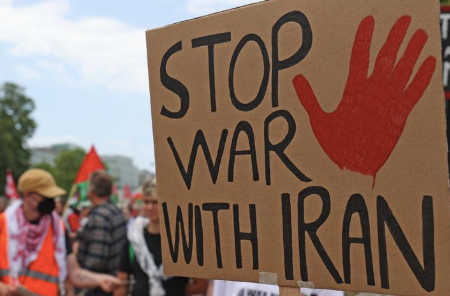As tensions rise in the Middle East, there is a surge following tit-for-tat military actions between Iran, Israel and the United States; European nations are stepping up diplomatic efforts and calling for restraint. The recent U.S. airstrikes on Iranian nuclear and military facilities, coupled with Iran’s retaliatory attacks and Israel’s aggressive air raids on strategic targets in Tehran.
As tensions in the Middle East surge following tit-for-tat military actions between Iran, Israel, and the United States, European nations are stepping up diplomatic efforts and calling for restraint. The recent U.S. airstrikes on Iranian nuclear and military facilities, coupled with retaliatory attacks and Israel’s aggressive air raids on strategic targets in Tehran, have triggered alarms across European capitals. The European Union is struggling to maintain internal consensus on its foreign policy. Now faces the daunting task of navigating a deeply complex crisis that threatens global peace and economic stability.
Leaders from major European powers, France, Germany, and the United Kingdom, have issued coordinated statements urging all parties to de-escalate this situation immediately. The French President Emmanuel Macron warned that Iran’s hint threat to shut down the Strait of Hormuz would be an “act of extreme provocation,” risking not only regional chaos but also global economic shockwaves, Germany’s Chancellor Friedrich Merz and British Prime Minister Keir Starmer echoed this sentiment, underliing the importance of maintaining diplomatic channels and avoidinh moves that could ignited a broader war in the Gulf and beyond.
The European Union’s diplomatic corps is actively engaging with Middle Eastern leaders to push for a ceasefire and the revival of backchannel communications. A special E3 France, Germany, and UK dialogue was hastily organized with Iran’s foreign minister in Geneva. The initial reports suggest Iran is moving towards closer ties with Russia instead of responding positively to European overtures. There is a shift that complicates Europe’s already limited leverage, especially as the U.S. pursues a more militarized strategy in the region, reportedly without full consultation with the NATO allies.
Humanitarian concerns are also at the heart of Europe’s approach. EU foreign policy chief Kaja Kallas called for an urgent ceasefire in Gaza, where Israeli airstrikes have resulted in devastating civilian casualties, including the bombing of a school sheltering displaced families. European Commission President Ursula von der Leyen condemned attacks on non-combatants and demanded Israel reopen humanitarian corridors and halt operations that breach international law. These calls reflect mounting pressure from civil society and human rights groups within the EU, which are increasingly vocal about what they see as Europe’s moral obligation to prevent further bloodshed.
However, the EU’s internal divisions are becoming more pronounced. Countries like Spain, Ireland, and the Netherlands have called for a tougher stance against Israel, including suspending the EU-Israel Association Agreement and implementing arms embargoes. In contrast, Germany, Italy, and Hungary are resisting such measures, citing the need to maintain strategic dialogue with Tel Aviv. This divergence is weakening the EU’s unified diplomatic front and delaying decisive action, even as the conflict intensifies.
Meanwhile, European citizens are not staying silent. Mass protests in cities such as The Hague, Brussels, and Madrid have drawn hundreds of thousands of demonstrators demanding an end to the violence. Movements like the “Red Line” protests in the Netherlands are urging EU leaders to impose sanctions on Israel and recognize Palestinian statehood. These protests are starting to impact political discourse, placing additional pressure on governments to adopt more assertive humanitarian policies.
In conclusion, while European nations are united in calling for restraint, their responses reveal a continent grappling with internal contradictions, external pressures, and rising expectations from its citizens. Whether Europe can effectively mediate the current crisis will depend not just on diplomatic finesse but on its ability to present a cohesive, principled, and proactive stance amid one of the most dangerous geopolitical flashpoints in recent history. Keep Reading Questeuro.com for more news.

More Stories
Legislation in the Brushing to Develop Digital Safety Net to Protect the Generation Screen from Harm
Secret Medieval Tunnel Unearthed Beneath Swiss Alps Church
Macron Announces Evian as Host for Next G7 Summit